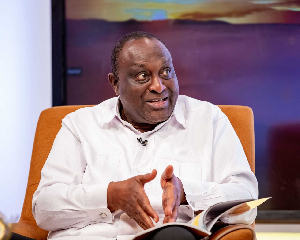
The continuous conflict between the Supreme Court and Parliament has been denounced by independent presidential candidate Alan Kyerematen as "unwarranted, unjustifiable, unproductive, and unhealthy for our fledgling democracy."
Speaking to the media on Thursday, October 31, in his dual roles as a prominent political person and a lawyer, Mr. Kyerematen stressed the need of both institutions operating within the bounds of the constitution and honoring the rules that govern the country.
The Supreme Court’s Interpretation Under Scrutiny
Mr. Kyerematen claims that the Supreme Court's recent decision to overrule the Speaker of Parliament's position on the status of four Members of Parliament, which was brought by Hon. Alexander Afenyo-Markin, the head of the NPP Caucus, was unconstitutional. He maintained that although the Supreme Court has the power to interpret the Constitution, this power shouldn't be used arbitrarily, particularly in situations where national stability is at stake.
"Article 97 (1) (g) and (h) of the Constitution cannot be said to lack clarity," Mr. Kyerematen explained. Any incumbent member of Parliament who changes their position in Parliament by joining a different party or becoming independent must have their seat declared empty by the Speaker of Parliament, as required by the aforementioned requirements, which are extremely explicit in both language and spirit.
Quoting the constitutional provisions directly, Mr. Kyerematen pointed out that a Member of Parliament must vacate their seat “if he leaves the party of which he was a member at the time of his election to Parliament to join another party or seeks to remain in Parliament as an independent member…or if he was elected a member of Parliament as an independent candidate and joins a political party.”
He added, “It is obvious from the mandatory language of the provision…that no issue arises of interpretation, requiring the Supreme Court to exercise its discretion. The Supreme Court’s mandate to interpret provisions of the Constitution is not to be exercised capriciously, particularly in very sensitive contexts with implications for subverting the rule of law and obstructing the principle of Separation of Powers.”
Parliament’s Obligation to Respect the Rule of Law
Mr. Kyerematen further noted that Parliament is bound by Article 133 (1) of the Constitution, which mandates all arms of government, including the Legislature, to comply with Supreme Court decisions. Any refusal to accept such decisions, he argued, would constitute a breach of the law. “Even if Parliament is of the view that the decision of the Supreme Court is wrong, it must comply with the orders of the Court, and adopt a judicial path to the resolution of the matter.”
While he commended Parliament for eventually seeking a judicial review, he also critiqued the approach taken. “The claim by Parliament that it is a ‘Master of Its own Rules’ has no merit in law and seeks to undermine the very spirit underpinning the concept of checks and balances between the various arms of Government,” Mr. Kyerematen emphasized.
Implications for Ghana’s Political Stability
With the General Elections rapidly approaching, Mr. Kyerematen warned that an unresolved rift between the Judiciary and Legislature could jeopardize national stability. “It is absolutely critical that all parties—the Judiciary, the Legislature, the Executive, and the citizenry of Ghana—work towards a resolution of this delicate matter to ensure a peaceful path towards the 2024 General Elections in December.”
He closed his address with a call to action, urging all parties to prioritize the nation’s welfare over institutional power struggles. “God Bless our Homeland Ghana and make our Nation great and strong,” he concluded, calling for a collective commitment to uphold Ghana’s democratic foundations in this critical period.
https://3news.com/news/the-decision-of-the-supreme-court-is-unconstitutional-alan-kyerematen/#